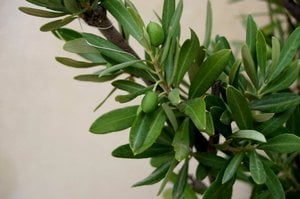Last winter, my husband caught some little bug that was flying around and just could not shake it. A friend showed up with a bottle of olive leaf extract, informing my husband that it would cure what ailed him. It did — and quickly. (He was feeling much better by the very next day.) When the same bug decided to attack me, hubby said to take the olive leaf extract. I did, and it worked. I cannot say, however, that I was happy about the treatment. Hubby assured me that it did not taste that bad. He was wrong! He then said that it tasted better in orange juice. He lied! Olive leaf extract is just nasty tasting. I keep something else to drink close at hand to chase the stuff down. It does work, though, and extremely well.
Olive leaf was used by the ancient Egyptians as a medicinal herb and also as one of the herbs in the mummification process, since it was believed to be a sacred herb. In the early 1800s, olive leaf was used to treat fevers and much later to treat malaria. I am always hesitate to describe any herb as a panacea. So many have been described thusly, only to be proven to not be as fabulous as the early claims. I would make an exception for olive leaf extract, however. When studies were begun in the mid-1990s, researchers discovered that olive leaf extract can boost the immune system and raise energy levels. There are numerous illnesses which can benefit from treatment with olive leaf extract. These include: the common cold, flu, pneumonia, tuberculosis, herpes I and II, hepatitis B, shingles, chronic fatigue, gonorrhea, malaria, diarrhea, and various infections; e.g., dental, urinary tract, surgical, and ear. In addition, there have been promising results in the treatment of HIV/AIDS. (Research is still being conducted in regard to this use of olive leaf extract.) Olive leaf extract has also been shown to lower blood pressure and help to protect cardiovascular health. In fact, it has been shown to actually reverse arteriosclerosis when taken over a long period of time. In addition, it has anti-inflammatory properties, which may give hope to arthritis sufferers. As if all of this was not enough, olive leaf extract as even been shown to help to regulate blood sugar levels, making it a possible treatment for diabetes.
There have been no adverse side effects associated with continued use of olive leaf extract. Many doctors, however, recommend that you do take a break from it during the month. In other words, take a day or two off during the week and another full week off during each month. I only take it for 2-3 days as needed. (If you use the liquid extract instead of taking the pills, you will not be tempted to take it daily. Did I happen to mention that this stuff tastes absolutely horrible?) Of course, as with any herbal medication, you should consult your primary care physician and/or a certified herbalist. This is especially true if you wish to take olive leaf extract as a treatment for any serious condition, such as heart disease or diabetes. There are no known drug interactions; however, it is best to discuss any possible interactions with your physician first.
Despite the normal precautions that should be taken and in spite of the taste, olive leaf extract is proving to be quite an effective herbal remedy. Now you understand why I have made the exception and call it a possible panacea.
References:
Herb Wisdom. Olive leaf (Olea europaea): Olive leaf benefits.
Ray Sahelian. Olive Leaf Extract supplement benefit and side effects by Ray Sahelian, M.D.
